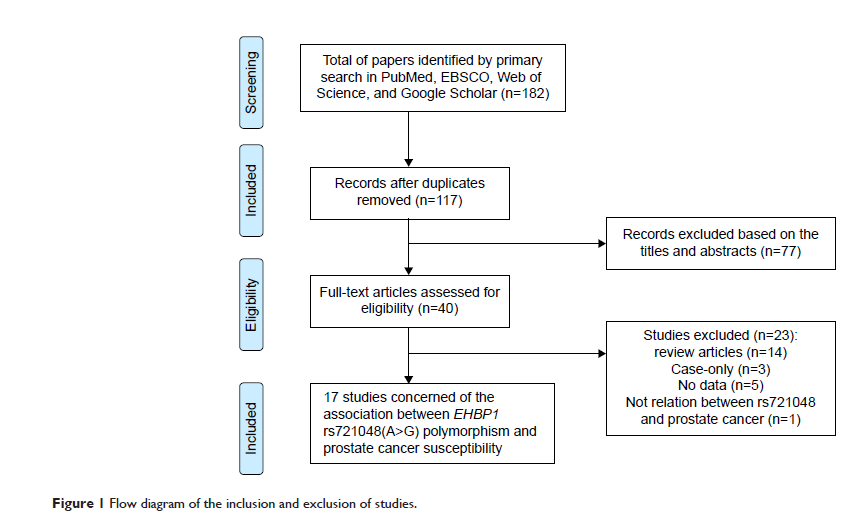9 0 6 7 6
论文已发表
注册即可获取德孚的最新动态
IF 收录期刊
- 2.6 Breast Cancer (Dove Med Press)
- 3.9 Clin Epidemiol
- 3.3 Cancer Manag Res
- 3.9 Infect Drug Resist
- 3.6 Clin Interv Aging
- 4.8 Drug Des Dev Ther
- 2.8 Int J Chronic Obstr
- 8.0 Int J Nanomed
- 2.3 Int J Women's Health
- 3.2 Neuropsych Dis Treat
- 4.0 OncoTargets Ther
- 2.2 Patient Prefer Adher
- 2.8 Ther Clin Risk Manag
- 2.7 J Pain Res
- 3.3 Diabet Metab Synd Ob
- 4.3 Psychol Res Behav Ma
- 3.4 Nat Sci Sleep
- 1.9 Pharmgenomics Pers Med
- 3.5 Risk Manag Healthc Policy
- 4.5 J Inflamm Res
- 2.3 Int J Gen Med
- 4.1 J Hepatocell Carcinoma
- 3.2 J Asthma Allergy
- 2.3 Clin Cosmet Investig Dermatol
- 3.3 J Multidiscip Healthc

已发表论文
EHBP1 rs721048(A>G) 多态性与与前列腺癌易感性之间的联系:对涉及 150,678 位受试者的 17 项研究的汇总分析
Authors Ao X, Liu Y, Bai XY, Qu X, Xu Z, Hu G, Chen M, Wu H
Published Date July 2015 Volume 2015:8 Pages 1671—1680
DOI http://dx.doi.org/10.2147/OTT.S84034
Received 5 March 2015, Accepted 18 May 2015, Published 7 July 2015
Approved for publication by Professor Jianmin Xu
Background: EHBP1 rs721048(A) was first identified as a prostate cancer (PCa) risk in Caucasians by genome-wide association study, but subsequent replication studies involving Caucasian and other ethnicities did not produce consistent results. The aim of this study was to obtain a more definite association between rs721048(A) and PCa risk.
Methods: We comprehensively searched several databases updated to September 2014, including PubMed, Web of Science, EBSCO, and Google Scholar. Two authors independently screened and reviewed the eligibility of each study. The quality of the included studies was assessed by the Newcastle–Ottawa scale. The association of rs721048(A) and PCa risk was assessed by pooling odds ratios (ORs) with 95% confidence intervals (CIs).
Results: A total of 17 studies, including 48,135 cases and 102,543 controls, published between 2008 and 2014 were included in the meta-analysis. Overall, the pooled analysis demonstrated that rs721048(A) was significantly associated with the risk of PCa under the allele model (OR=1.14, 95% CI=1.11–1.17, P =0.000). Subgroup analysis based on ethnicity revealed a significant association between rs721048(A) and PCa in Caucasian (OR=1.14, 95% CI=1.11–1.16, P =0.000), African descent (OR=1.11, 95% CI=1.01–1.23, P =0.025), and Asian (OR=1.35, 95% CI=1.12–1.64, P =0.002).
Conclusion: Our results provided strong evidence that rs721048(A) could be a risk factor for PCa.
Keywords: EHBP1, rs721048, meta-analysis, prostate cancer
Methods: We comprehensively searched several databases updated to September 2014, including PubMed, Web of Science, EBSCO, and Google Scholar. Two authors independently screened and reviewed the eligibility of each study. The quality of the included studies was assessed by the Newcastle–Ottawa scale. The association of rs721048(A) and PCa risk was assessed by pooling odds ratios (ORs) with 95% confidence intervals (CIs).
Results: A total of 17 studies, including 48,135 cases and 102,543 controls, published between 2008 and 2014 were included in the meta-analysis. Overall, the pooled analysis demonstrated that rs721048(A) was significantly associated with the risk of PCa under the allele model (OR=1.14, 95% CI=1.11–1.17, P =0.000). Subgroup analysis based on ethnicity revealed a significant association between rs721048(A) and PCa in Caucasian (OR=1.14, 95% CI=1.11–1.16, P =0.000), African descent (OR=1.11, 95% CI=1.01–1.23, P =0.025), and Asian (OR=1.35, 95% CI=1.12–1.64, P =0.002).
Conclusion: Our results provided strong evidence that rs721048(A) could be a risk factor for PCa.
Keywords: EHBP1, rs721048, meta-analysis, prostate cancer
